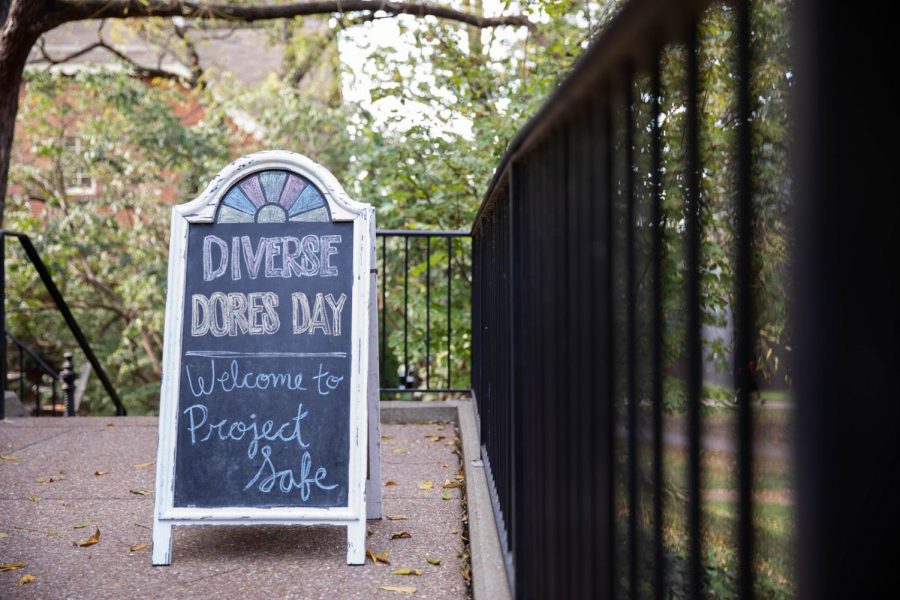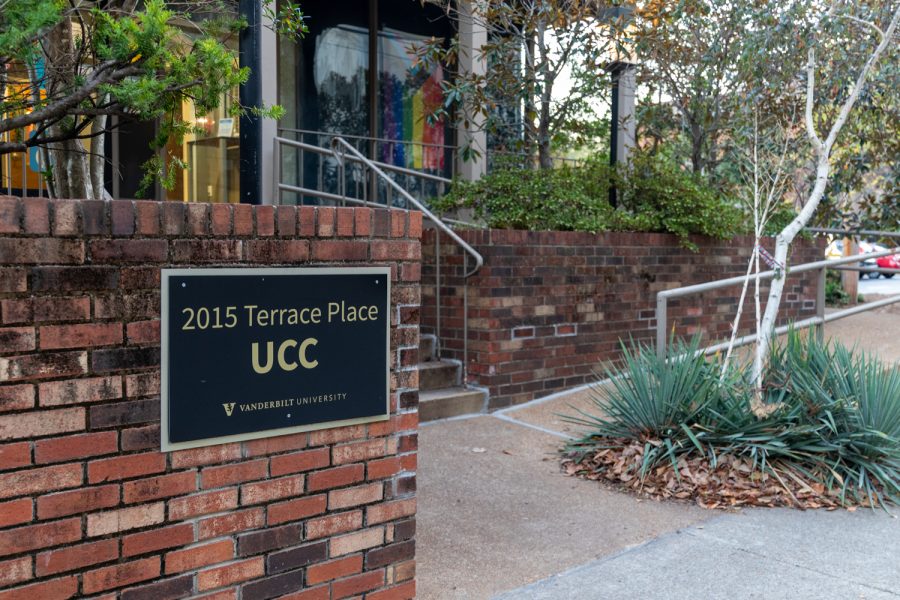Sam Zern contributed to this report.
Content warning: sexual harassment
A former student who was accused of photographing and videotaping women in the shower in two different houses on Branscomb Quadrangle filed a complaint against Vanderbilt on Feb. 5, claiming his reputation has been “irreparably damaged” by information that was spread by Project Safe Director Cara Tuttle Bell, Director of Student Accountability Mary Helen Solomon and Compliance Specialist Carla Brookins during the investigation they conducted.
The case is currently being litigated in Tennessee State Court. The complaint states that the accused was a second year student at the time of the incident. It is not stated anywhere in the public documents that he has been expelled from or asked to leave the university, but university filings call the student accused a “former Vanderbilt student.”
What happened?
The accused student, who goes by the pseudonym John Doe throughout the complaint and was a sophomore at the time of the filing, visited his friend, referred to using the pseudonym Cindy Roe, in her room in Lupton House on Oct. 2. When he got to her floor, “needing to use a restroom, [he] went to the one closest to the elevator even though that restroom was a Lady’s Room.” He looked in and didn’t see anyone inside, at which point he used the restroom and then went to Cindy’s room for the night, something he had been doing several times a week since the beginning of the fall 2017 semester, the complaint said.
According to the complaint, three days later, Mary Helen Solomon, the Director of the Office of Student Accountability, notified Doe that he had been accused of using his cell phone to take pictures and/or videos of a female student while she was showering in the Lupton bathroom, which Solomon said is considered sexual exploitation and a violation of Vanderbilt’s Sexual Misconduct policy. Furthermore, the complaint said that security footage showed Doe entering women’s restrooms in Lupton and Stapleton houses on six additional occasions during the fall 2017 semester.
VUPD had interviewed Doe and checked his cell phone the day before and did not find any evidence of photos or videos of women showering, the complaint said.
Doe’s complaint alleges that several Vanderbilt employees spread false information and defamed his character. Brookins informed Bell of the allegations, and Bell contacted the female students who were seen entering the bathroom just before Doe entered, the complaint says. During her meetings with these women, who are referred to as Rachel Roes 1-10 in the complaint, Bell told them about the alleged events and showed them a compilation of security footage showing Doe walking into the women’s restrooms.
The Rachel Roes 1-10 are also defendants in the lawsuit. One of these women, referred to as Rachel Roe 1, “went on a crusade throughout the Vanderbilt community to have Doe ostracized despite not having any verifiable information that Doe had videotaped her or anyone else in the women’s room.” The complaint states that one or more of the Rachel Roes spread this information to friends at other colleges, leading Doe to receive “countless harassing messages on Facebook and other social media” from individuals who appear to have attended high school with the Rachel Roe defendants.
“Sup creep. Do you actually think taking videos of girls showering is ok? Sick dude. Really classy. You are actually a disgusting, pathetic leech of a human being,” one such message read, according to the complaint.
Doe was expelled from his fraternity and banned from all sororities on campus, the complaint said.
What did Doe claim the university did wrong?
Doe claimed in his complaint that Rachel Roes 1-10 received “false and defamatory information” regarding Doe, and then repeated said information, which makes them liable in addition to the “Vanderbilt Defendants”––Bell, Brookins and Solomon. Doe’s attorneys declined to comment for this article.
Vanderbilt, Doe said in the complaint, “wrongly and falsely accused” him of taking pictures and/or videos of women showering. The security footage, Doe notes, contained no evidence that he did anything but walk into the bathroom.
Further, Doe’s complaint accuses Brookins and Bell of violating Vanderbilt’s confidentiality requirements, claiming that the Office of Civil rights “specifically warns that a school should be aware of the confidential concerns of an accused student.”
“Project Safe’s and Defendant Bell’s ‘outreach’ efforts took the form of spreading rumors and innuendos verbally and in writing about Doe rather than seeking information to determine whether the women they were contacting were in fact involved,” the complaint says.
Doe alleges in the complaint that Bell, Brookins and Solomon didn’t tell the Rachel Roes to keep the allegations against him confidential, which resulted in the women being able to spread the information across Vanderbilt’s campus and the United States.
As a result of the incident, Doe is “suffering from severe anxiety and depression,” and his reputation has been “irreparably damaged,” the complaint said.
Doe’s complaint includes five causes of action: defamation, false light invasion of privacy, intentional infliction of emotional distress, negligence and civil conspiracy to commit false light invasion of privacy and defamation.
How did Vanderbilt respond?
Vanderbilt filed a motion to dismiss the complaint, along with a memorandum in support of the dismissal, on March 22. The memorandum stated the complaint should be dismissed completely and that “each of Plaintiff’s claims fail for numerous reasons.” Vanderbilt’s attorneys, as well as Bell, Brookins and Solomon, declined to comment for this article.
Vanderbilt, according to the memorandum, was obligated under federal law and their own Sexual Misconduct Policy to conduct an investigation when they received a “credible complaint” about Doe photographing/videotaping women showering. Furthermore, the communications that occurred among the Vanderbilt staff members and the Rachel Roes consisted of privileged information as it was essential to performing the legally necessary investigation.
Specifically, Vanderbilt contested the defamation and false light claims because, under Tennessee law, a plaintiff must establish that the potentially defamatory information was included in a published statement, knowing that it is false and defamatory or “with reckless disregard for the truth of the statement or with negligence in failing to ascertain the truth of the statement.” Vanderbilt claims that even if these elements were met, if the statements were made “in good faith upon any subject matter in which the party communicating has an interest, or in reference to which he has a duty to a person having a corresponding interest or duty,” which Vanderbilt claims they were, then they are privileged.
“Communications between and among Vanderbilt employees about the substance of the investigation, and by Vanderbilt employees with students who were reasonably included in the investigation, are protected from tort liability,” the memorandum states. “The privilege that attaches to those communications is essential to allowing colleges and universities to fulfill their legal obligations and to ensuring that their campuses are free from sexual misconduct, sexual harassment, and sex discrimination.”
Furthermore, the memorandum states that the Vanderbilt personnel met with no more than 10 students, which doesn’t suffice to show “wide and broad dissemination required” to support Doe’s defamation claim.
Vanderbilt’s memorandum makes the claim that the the complaint comes “nowhere near meeting the ‘high threshold standard’” required to make a claim of intentional infliction of emotional distress. According to the memorandum, the Tennessee Supreme Court explained that intentional infliction of emotional distress is reserved for situations in which the defendant has engaged in acts which are “so outrageous in character, and so extreme in degree as to go beyond all bounds of decency, and to be regarded as atrocious, and utterly intolerable in a civilized community.”
The negligence claim is addressed in the memorandum with similar arguments as those used to address the defamation claim. Finally, the memorandum asserts that the conspiracy claim does not hold water because the underlying events––the defamation and false light invasion of privacy claims––had been addressed earlier in the memorandum. According to the memorandum, the conspiracy claim doesn’t stand regardless, because of a previous lawsuit in which the judge concluded that “there can be no actionable claim of conspiracy where the conspiratorial conduct alleged is essentially a single act by a single corporation acting through its officers, directors, employees, and other agents, each acting within the scope of his or her employment,” which Vanderbilt claims is the case here.
View John Doe’s complaint and Vanderbilt’s memorandum here.
[aesop_document type=”pdf” src=”https://vanderbilthustler.com/wp-content/uploads/2018/04/2018.02.05-complaint.pdf” caption=”John Doe’s Complaint”]
[aesop_document type=”pdf” src=”https://vanderbilthustler.com/wp-content/uploads/2018/04/2018.03.22-memorandum-in-support-of-dismissal.pdf” caption=”Vanderbilt’s Memorandum in Support of Dismissal”]

















